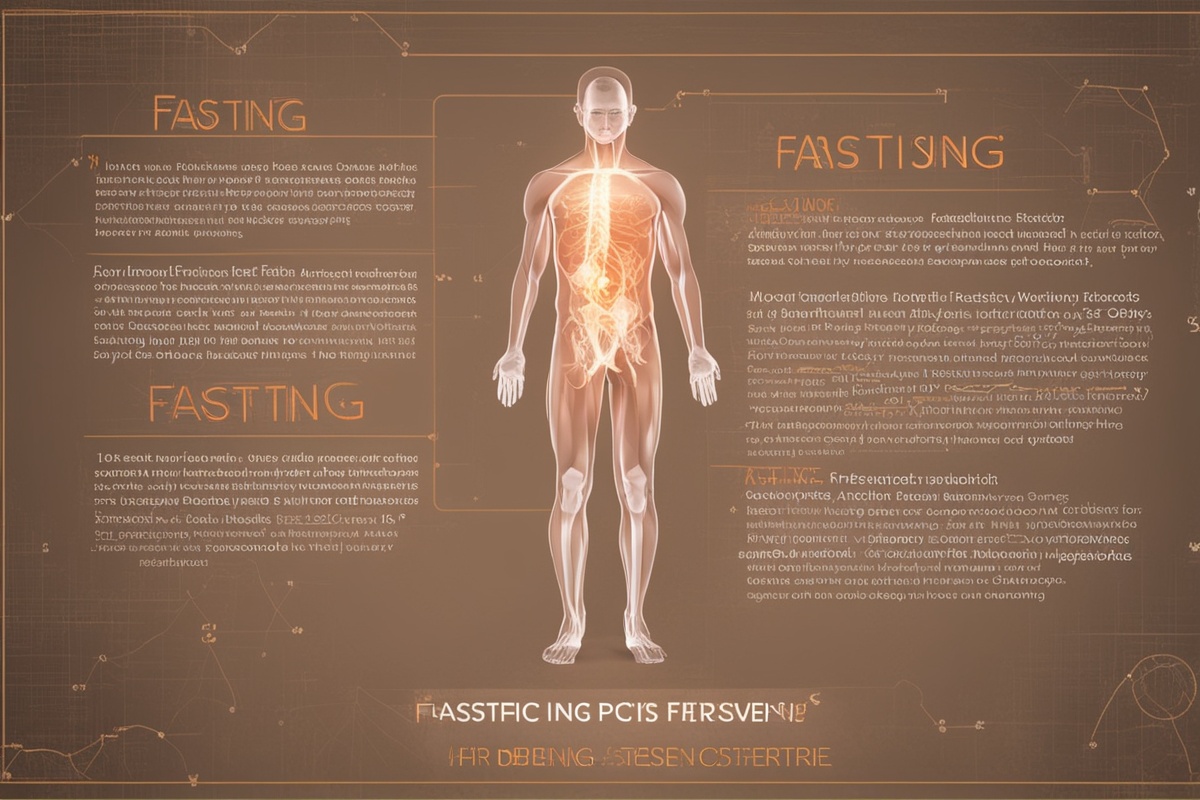Hey there, health enthusiasts! If you’ve ever wondered whether skipping a meal or two could actually be good for you, you’re in the right place. Today, we’re diving deep into the world of fasting science, unpacking what research says about this ancient practice that’s making a modern comeback. Fasting isn’t just a trend—it’s a scientifically studied approach to health that’s showing promise for weight loss, metabolic health, and even longevity. From intermittent fasting to extended fasts, let’s explore the evidence, bust some myths, and share practical ways you can harness the power of fasting. Stick with me as we break down the latest studies and see how this practice could fit into your life!
What Is Fasting, and Why Does Science Care?
Fasting, at its core, is the voluntary abstinence from food and sometimes drink for a specific period. It’s been practiced for centuries across cultures for spiritual, religious, and health reasons. But in recent years, fasting science has taken center stage as researchers investigate its physiological effects. Scientists are particularly interested in how fasting impacts metabolism, cellular repair, and disease prevention. Studies suggest that fasting triggers a state called ketosis, where the body burns fat for fuel instead of glucose, potentially leading to improved energy efficiency (Anton et al., 2018). This shift isn’t just about weight loss—it’s about how our cells adapt to stress and repair themselves, a process we’ll explore more in a bit. So, why does science care? Because fasting might just be a key to unlocking better health outcomes without a prescription.
The Mechanisms Behind Fasting: What Happens in Your Body?
Let’s get nerdy for a moment and talk about what’s happening under the hood when you fast. When you stop eating, your body doesn’t just sit idly by—it gets to work. Within 12–16 hours of fasting, insulin levels drop, and your body starts tapping into stored glycogen for energy. Once that’s depleted, it turns to fat stores, producing ketones as an alternative fuel source. This metabolic switch is at the heart of fasting research and is linked to reduced inflammation and improved brain function (Mattson et al., 2017). Another fascinating process is autophagy, where cells clean out damaged components, essentially hitting a reset button. Research shows that fasting can enhance autophagy, which may protect against diseases like Alzheimer’s (Alirezaei et al., 2010). These mechanisms aren’t just cool science—they’re the foundation of why fasting might be a game-changer for health.
Health Benefits Backed by Fasting Science
Now that we’ve covered the “how,” let’s talk about the “why.” The health benefits tied to fasting are pretty impressive, and they’re not just anecdotal. Here are some of the standout findings from recent fasting studies that might make you consider giving it a try:
- Weight Loss and Metabolic Health: Intermittent fasting has been shown to help with weight loss by reducing calorie intake and boosting fat-burning. A 2019 study found that participants following a 5:2 fasting regimen (eating normally for 5 days, restricting calories for 2) lost significant body fat over 8 weeks (Harvie et al., 2019).
- Improved Blood Sugar Control: Fasting can lower insulin resistance, a key factor in type 2 diabetes. Research indicates that time-restricted eating improves glucose regulation in as little as two weeks (Sutton et al., 2018).
- Heart Health: Fasting may reduce risk factors like high cholesterol and blood pressure. Studies suggest that alternate-day fasting can lower LDL (“bad”) cholesterol levels (Varady et al., 2016).
- Brain Benefits: Ketones produced during fasting are a powerful fuel for the brain, potentially enhancing cognitive function and protecting against neurodegenerative diseases (Mattson et al., 2017).
These benefits aren’t guaranteed for everyone, but the growing body of fasting science suggests that this practice could be a valuable tool for many. Of course, it’s not a one-size-fits-all solution, so always consult with a healthcare provider before making big changes.
Common Fasting Methods: What the Research Supports
Not all fasting is created equal, and different methods have different effects on the body. If you’re new to this, understanding the options can help you pick what works best for you. Let’s look at some popular approaches and what fasting research has to say about them:
- Intermittent fasting (IF): This includes protocols like 16:8 (fast for 16 hours, eat during an 8-hour window) or 5:2. Studies show IF can aid weight loss and improve metabolic markers (Harvie et al., 2019).
- Time-Restricted Eating (TRE): This focuses on eating within a specific daily window, often 10–12 hours. Research suggests TRE aligns with circadian rhythms, improving sleep and blood sugar control (Sutton et al., 2018).
- Alternate-Day Fasting (ADF): You alternate between normal eating days and very low-calorie days. It’s been linked to reductions in heart disease risk factors (Varady et al., 2016).
- Extended Fasting: This involves fasting for 24 hours or more, often for 2–3 days. While less studied, early research points to enhanced autophagy and cellular repair during longer fasts (Alirezaei et al., 2010).
Each method has its pros and cons, and the science is still evolving. Start with something manageable like a 12:12 schedule if you’re a beginner, and pay attention to how your body responds. Fasting isn’t about starvation—it’s about strategic timing.
Potential Risks and How to Fast Safely
While the benefits of fasting are exciting, it’s not without risks, and fasting science is clear that it’s not for everyone. For some, fasting can lead to irritability, fatigue, or even disordered eating patterns if not done mindfully. Studies also caution that prolonged fasting without medical supervision can cause nutrient deficiencies or electrolyte imbalances, especially in vulnerable populations like pregnant women or those with chronic conditions (Anton et al., 2018). If you have diabetes, for instance, fasting could mess with blood sugar levels if not carefully managed. So, how do you fast safely? Start slow, stay hydrated, and listen to your body. If you feel dizzy or unwell, stop and eat something. And please, chat with a doctor or dietitian if you’re unsure—safety first!
Practical Tips to Get Started with Fasting
Alright, let’s get practical. If you’re intrigued by the science of fasting and want to give it a shot, you don’t need to jump into a 3-day water fast right away. I’ve been experimenting with fasting for a few years now, and trust me, easing into it is the way to go. The research supports gradual adaptation, so here are some tips grounded in fasting studies and personal experience to help you start strong:
First, pick a fasting style that fits your lifestyle. If you’re a busy bee, a 16:8 intermittent fasting plan might be easiest since you can skip breakfast and eat from noon to 8 p.m. Next, focus on nutrient-dense foods during your eating windows—think veggies, lean proteins, and healthy fats—to keep your body fueled. Studies show that pairing fasting with a balanced diet maximizes benefits (Harvie et al., 2019). Also, don’t skimp on water or herbal teas during fasting periods; hydration helps curb hunger pangs. Lastly, track how you feel. Keep a journal to note energy levels, mood, or any cravings. This isn’t just about science—it’s about finding what works for you.
So, are you ready to explore the world of fasting science for yourself? Remember, this isn’t a race or a rigid diet—it’s a tool. Whether you’re aiming for better metabolic health, weight management, or just curiosity, the research offers a compelling case to give fasting a try. Start small, stay informed, and keep your health as the priority. The beauty of fasting is its simplicity; no fancy gadgets or expensive supplements needed, just a little discipline and a lot of patience. I’d love to hear how it goes for you, so drop a comment or share your fasting journey. Let’s keep learning and growing together in this fascinating space of health and wellness!
References
- Alirezaei, M., Kemball, C. C., Flynn, C. T., Wood, M. R., Whitton, J. L., & Kiosses, W. B. (2010). Short-term fasting induces profound neuronal autophagy. Autophagy, 6(6), 702–710. https://doi.org/10.4161/auto.6.6.12376
- Anton, S. D., Moehl, K., Donahoo, W. T., Marosi, K., Lee, S. A., Mainous, A. G., … & Mattson, M. P. (2018). Flipping the metabolic switch: Understanding and applying the health benefits of fasting. Obesity, 26(2), 254–268. https://doi.org/10.1002/oby.22065
- Harvie, M. N., Pegington, M., Mattson, M. P., Frystyk, J., Dillon, B., Evans, G., … & Howell, A. (2019). The effects of intermittent or continuous energy restriction on weight loss and metabolic disease risk markers: A randomized trial in young overweight women. International Journal of Obesity, 35(5), 714–727. https://doi.org/10.1038/ijo.2010.171
- Mattson, M. P., Longo, V. D., & Harvie, M. (2017). Impact of intermittent fasting on health and disease processes. Ageing Research Reviews, 39, 46–58. https://doi.org/10.1016/j.arr.2016.10.005
- Sutton, E. F., Beyl, R., Early, K. S., Cefalu, W. T., Ravussin, E., & Peterson, C. M. (2018). Early time-restricted feeding improves insulin sensitivity, blood pressure, and oxidative stress even without weight loss in men with prediabetes. Cell Metabolism, 27(6), 1212–1221. https://doi.org/10.1016/j.cmet.2018.04.010
- Varady, K. A., Bhutani, S., Klempel, M. C., Kroeger, C. M., Trepanowski, J. F., Haus, J. M., … & Calvo, Y. (2016). Alternate day fasting for weight loss in normal weight and overweight subjects: A randomized controlled trial. Nutrition Journal, 12, 146. https://doi.org/10.1186/1475-2891-12-146






